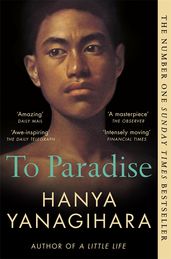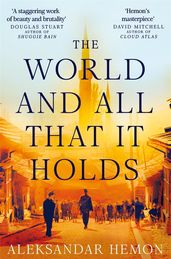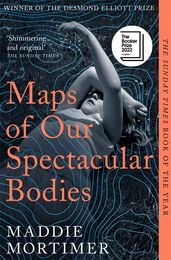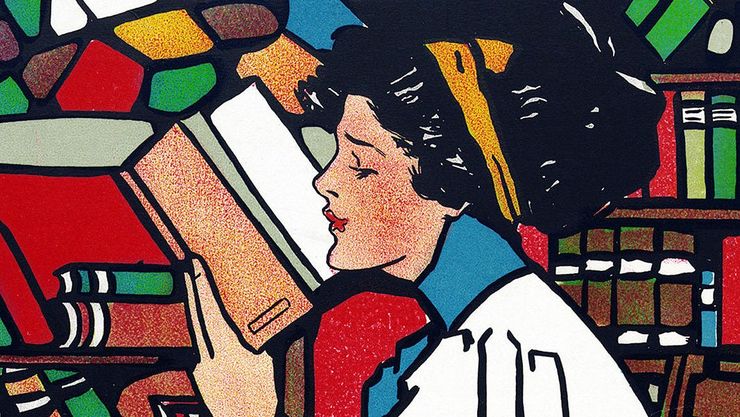What to read next, based on your favourite composer
As the Proms return to the Royal Albert Hall for the summer, we offer reading suggestions inspired by some of the featured composers.

From Vivaldi to Max Richter, we've paired some of the composers due to be performed at the famous classical music festival with a book we think matches their style.
Vivaldi
To Paradise
by Hanya Yanagihara
We start with a virtuosic three-movement book for fans of Baroque's leading proponent of the concerto form – we'll let readers decide whether New York City or just the vivid brilliance of Hanya Yanagihara's mind is the star soloist. In an alternative 1893, New York is part of the Free States, and a gentle young member of a privileged family falls for a charismatic and impoverished music teacher. In 1993, Manhattan is being swept by the AIDS epidemic, and a young Hawaiian man with a wealthy older partner must hide his difficult family background. And in 2093, in a world where plague and totalitarian rule is rife, a young woman tries to solve the mystery of her husband's disappearances. What unites these characters, and these Americas, are their reckonings with the qualities that make us human and the longing to find a place in an earthly paradise.
Mozart
The World and All That It Holds
by Aleksandar Hemon
Devotees of the master of pure, melodic elegance are recommended a recent literary equivalent. Aleksandar Hemon's novel is, according to Booker-Prize winner Douglas Stuart, a "staggering work of beauty." A masterfully well-researched piece of historical fiction, this epic romance and story of human resilience follows Pinto, a Sephardic Jew, and Osman, a Muslim, both of whom are conscripted into the Austro-Hungarian army in World War One. The horrors of war are softened by moments of tenderness between Pinto and Osman, written in a way we rarely see love between two men conveyed. Set among one of humanity’s most cataclysmic eras, this book goes beyond the historical headlines and instead shows how love and the human spirit of ordinary souls can triumph amidst all adversity.
Orff
In the Weeds
by B.K. Borison
The famous, dramatic opening movement of Orff's Carmina Burana belies the rather celebratory nature of the full piece and the set of twenty-four poems it's based on, which explore the joys of spring, youth, wine and sex. Not unlike B. K. Borison's rom-com In The Weeds, the spring of her quartet of seasonal romances which began with Lovelight Farms. When Beckett Porter meets Evelyn St. James at a bar, he has no idea she's a famous social media star, and is rather bamboozled when she appears on his farm as part of a social media contest. Evelyn is trying to find her way back to something real and has returned to the last place she was happy: Lovelight Farms and the tiny town of Inglewild. That this is where Beckett lives is, of course, a complete coincidence. . .
Beethoven
Bleak House
by Charles Dickens
The opening bars of the Fifth Symphony. The melody of Ode to Joy. Some works of art are so influential, so famous, that they have become part of the public consciousness, and Beethoven's oeuvre provides more than a few musical examples. Over in the literary world, Dickens has a similar reputation. But which book to choose? Taking inspiration from Beethoven's Ninth Symphony, thought to be the first example of a choral symphony by a major composer, we've chosen the Dickens novel with arguably the broadest canvas of voices: Bleak House. With a large cast of characters, several subplots and even a case of spontaneous combustion, the novel is a sprawling portrait of English society, a moving love story and a tightly plotted murder mystery all at once. It is also, at over 1,000 pages, a real chonk of a book, which seems somehow appropriate for Beethoven.
Mahler
Before the Coffee Gets Cold
by Toshikazu Kawaguchi
The hipster's favourite, Mahler's bridging of nineteenth-century traditions with twentieth-century modernism to deeply emotional effect finds its literary soulmate in Toshikazu Kawaguchi's cult bestseller Before the Coffee Gets Cold. In a small back alley in Tokyo, there is a café which offers its customers a unique experience: the chance to travel back in time. But this opportunity is not without risks: customers must sit in a particular seat, they cannot leave the café, and finally, they must return to the present before the coffee gets cold . . .
Gershwin
The Great Gatsby
by F. Scott Fitzgerald
Perhaps no surprises here, but it would feel almost deliberately contrary not to choose Fitzgerald's famous tale from America's Jazz Age for fans of one of its key composers. Jay Gatsby lives a mysterious existence in a luxurious Long Island mansion, hosting flamboyant and lavish parties for people he hardly knows, all with the aim of reuniting with his former lover Daisy Buchanan. Such levels of money and obsession rarely end well, and the novel pulses with the disillusionment of post-war America and the vacuum at the heart of a society so invested in wealth and status. But it's a dazzling, hedonistic ride, and you can almost hear the clarinet glissando and triumphant piano chords of Rhapsody in Blue floating through Gatsby's windows.
Richter
Maps of Our Spectacular Bodies
by Maddie Mortimer
Contemporary classical composer Max Richter is perhaps most widely known for his recomposition of the Four Seasons, in which aspects of Vivaldi's original score are intricately phased and looped. Enter Maddie Mortimer's genre-defying debut, which similarly combines the familiar (beautiful prose, third person narration) with the wildly inventive (a free flowing, punctuation-disregarding, intrusive yet darkly entertaining second voice) to create something original and hugely affecting. This dark kaleidoscope of a book renders the disorientation that comes with your mother dying, and of being that dying mother, with endless ingenuity. It’s a moving, daring debut that forces us to stare death in the face and refuses to let us look away.
Elgar
The Armour of Light
by Ken Follett
No Proms season is complete without Elgar's Pomp and Circumstance and a rousing rendition of his orchestration of Hubert Parry's Jerusalem. The latter takes its lyrics from a poem by William Blake written during the Napoleonic Wars, the conflict that is brooding in the near-distance in The Armour of Light. It's 1792, and unprecedented industrial change sweeps the land, making the lives of those working for Kingbridge’s prosperous cloth manufacturers a misery (Blake's "dark Satanic mills" perhaps. . .) As international conflict nears, the story of a small group of Kingsbridge townspeople will come to define the struggle of a generation as they seek enlightenment and fight for a future free from oppression. Ken Follett's latest is a gripping tale of revolution, political and industrial, with a cast of unforgettable characters.










